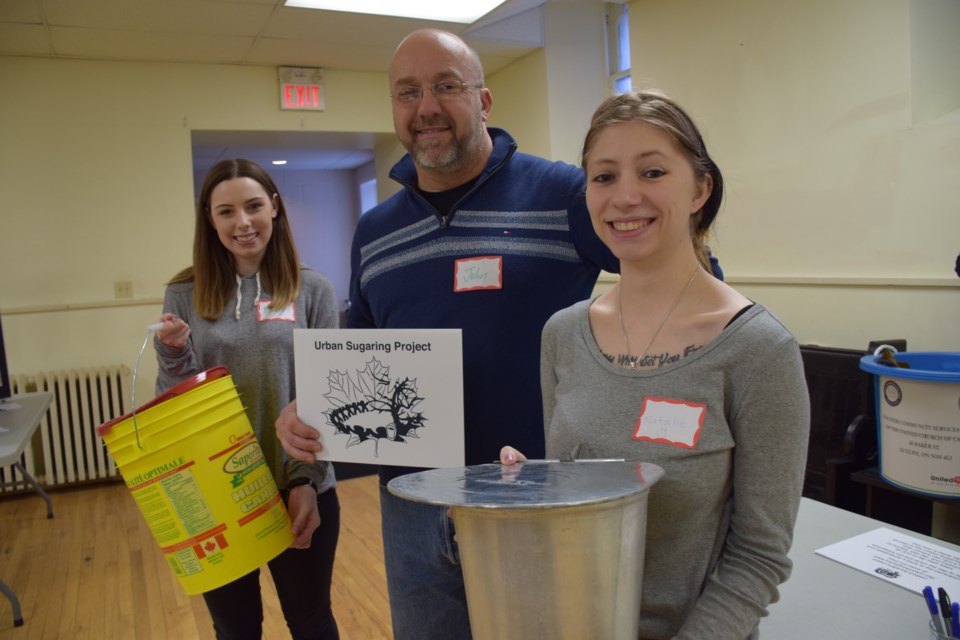Peak oil and maple syrup. They have a connection in Guelph.
For the second year, Transition Guelph is running its Urban Sugaring Project as a way to build resilience locally, and get local residents thinking about the many ways food can be produced in an urban landscape.
For a nominal rental fee, a resident with a maple tree(s) on their property can get the basic equipment they need to tap those trees, harvesting the sap and getting a portion of the syrup at the end of the process.
On Saturday, Transition Guelph held a kick-off pancake breakfast at St. James the Apostle Church, where tappers were recruited and equipment distributed. There were lots of pancakes served, and some of the homemade syrup from last year’s project was slathered over them.
Recruits were signed up, and for a $10 fee they got a rental bucket and tap, a larger sap collection pail and instructions for use.
When the time comes for the sap to run, usually in early March, they will tap their trees, collect the sap and bring it to a central collection locale where it will be boiled down and turned into delectable syrup.
Maple syrup has been a Canadian delicacy for centuries, first made by indigenous peoples who passed the skill on to European settlers.
A small hole is drilled in the trunk of a maple – preferably a sugar maple because of its higher concentrations of sugar, but Norway and silver maples also do the trick. A tap is hammered into the hole and a bucket hung on it, collecting drip by drip.
John Dennis is a Transition Guelph board member, and the coordinator of the Urban Sugaring Project. The project is part of the organizations Urban Food Working Group. Learn more about it here.
“What we do with the Urban Food Working Group is look at what is available in the city, what resources are there, and how can we best utilize them,” he explained.
He said there about 3,000 maple trees in Guelph, but they are a largely untapped food resource in the city.
“We thought, let’s give people the ability to tap the trees they have in their backyard, and let’s help them make maple syrup,” he said.
Last year, the goal was to get 50 residents and their trees involved. They got just over 70, who tapped about 1,200 litres of sap that became 30 litres of syrup.
“Transition Guelph is about resilience,” Dennis added. “The philosophy of our group is, what do we do when we are past peak oil, when it becomes really expensive to bring cheap food in from outside the country.
“So we look at what’s available locally, and how to keep the skills and the knowledge in the community for people to utilize those resources properly.”
He said people are loving the idea of tapping their own maple trees and getting syrup for their efforts. It gives them a strong connection to their trees. Last year’s syrup, he said, was “spectacular.”
“It really brings the connection back between what you’re eating and where it’s coming from,” he said. “I think there is something very fulfilling about growing your own food.”
Transition Guelph volunteers work with students from the Headwaters Program in the syrup processing operation.
Sugar-rich maple sap generally starts to shoot from root to branches just before spring, when temperatures rise just about zero during the day and return to freezing at night.
